Shaivism is one of the major traditions within Hinduism, centered around the worship of Lord Shiv as the supreme deity. It is one of the oldest and most diverse branches of Hinduism, with a rich philosophical, theological, and ritualistic tradition.

Shaivism revolves around the veneration of Lord Shiv as the supreme deity. Shiv is often depicted as the destroyer and transformer within the Hindu Trinity (Trimurti), alongside Brahma the creator and Vishnu the preserver. However, Shaivism emphasizes that Shiv is not just a destroyer but also the source of creation and the ultimate reality (Brahman).
Shaivism draws heavily from its own scriptural texts, known as the Shaiva Agamas and Shaiva Tantra. These texts provide instructions on temple construction, rituals, worship practices, meditation techniques, and philosophical teachings related to Shaivism.
Shaivism recognizes the complementary aspects of Shiv and Shakti (divine feminine energy). Shiv is often depicted alongside his consort, Parvati symbolizing the inseparable union of masculine and feminine energies. Shakti is regarded as the dynamic creative force, while Shiv represents pure consciousness.
One of the prominent symbols of Shaivism is the Lingam, which represents the formless aspect of Shiv. Lingam worship (Linga Puja) is a central ritual practice in Shaivite temples, where devotees offer prayers, flowers, water, and other offerings to the Lingam.
Some of the prominent schools of Shaivism include:
- Shaiva Siddhanta: Shaiva Siddhanta is one of the most influential schools of Shaivism, particularly in South India and Sri Lanka. It emphasizes the teachings found in the Shaiva Agamas and emphasizes the concept of Shiva as the ultimate reality (Patibheda) and the individual souls (Atman) as eternally dependent on Shiv. Shaiva Siddhanta also places importance on ethical conduct, devotion (bhakti), and ritual worship.
- Kashmir Shaivism: Kashmir Shaivism, also known as Trika Shaivism, originated in the Kashmir region of India. It is known for its sophisticated philosophical teachings, which emphasize the non-dualistic (Advait) nature of reality. Kashmir Shaivism emphasizes the concept of Shiv as pure consciousness (Chaitanya) and recognizes the inherent divinity within all beings. It also incorporates practices such as meditation, mantra recitation, and energetic techniques to realize one’s true nature.
- Pashupata Shaivism: Pashupat Shaivism is one of the oldest schools of Shaivism, attributed to the sage Lakulisha. It focuses on asceticism, ritual worship, and philosophical inquiry. Pashupat Shaivism emphasizes the concept of Pashupati, the lord of all beings, and advocates for the path of renunciation (sannyas) as a means to attain liberation (moksh). The Pashupat tradition incorporates a variety of practices, including meditation, yoga, and specific rituals.
- Lingayatism (Veera Shaivism): Lingayatism is a distinct Shaivite movement that originated in Karnataka, India, in the 12th century under the leadership of the saint and philosopher Basava. Lingayats reject caste distinctions and emphasize the importance of devotion (bhakti) to Shiv as the sole means of salvation. They wear an emblem of Shiv, known as the Ling or Ishtaling, as a symbol of their faith. Lingayatism also places a strong emphasis on social reform, ethical conduct, and community service.
- Nath Sampradaya: The Nath Sampradaya is a Shaivite tradition associated with the teachings of Matsyendranath and Gorakshanath, legendary figures in the Nath tradition. It emphasizes the practice of Hatha Yoga, Tantra, and Kundalini Yoga as means of spiritual realization. The Nath yogis are known for their renunciate lifestyle, esoteric practices, and teachings on the awakening of Kundalini energy.
These are some of the major schools of Shaivism, each with its own unique teachings, practices, and spiritual lineages. While they may have differences in philosophical perspectives and ritual practices, they all share a common reverence for Lord Shiv as the supreme deity and seek spiritual liberation through devotion, knowledge, and inner transformation.
Shaivism celebrates numerous festivals dedicated to Lord Shiv, such as Maha Shivaratri, which honors Shiv’s cosmic dance of creation and destruction. Other festivals include Shivaratri, Shravan Maas (the month of Shravan), and Pradosha. Overall, Shaivism is a vibrant and multifaceted tradition within Hinduism, encompassing a wide range of beliefs, practices, and philosophical insights centered around devotion to Lord Shiv as the supreme deity.